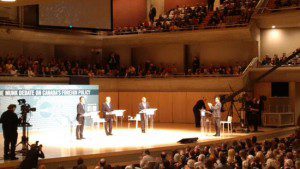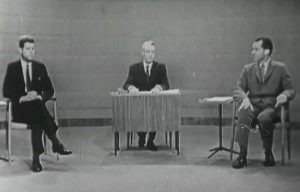
One could see the man was about to pounce. One could see that it was a debater’s moment – maybe even one of those so-called knockout punches. And the punch was aimed at the prime minister. Liberal leader, Justin Trudeau wound up and let it fly at Conservative leader Stephen Harper.
“Mr. Harper on (Bill) C-51,” Trudeau said of the anti-terrorism bill passed into law in June of this year, “wants us to be afraid that there’s a terrorist under every leaf and rock in Canada.”
Monday night was just the latest in the series of debates featuring the leaders of the three major political parties confronting each other in the lead-up to the federal election on Oct. 19. This particular night, the Munk Debates focused on foreign policy and while it appeared to offer a slightly more orderly presentation of the positions held by the leaders and their parties, it nonetheless descended into a figurative brawl over who’s not living up to previous promises, campaign commitments or the scrutiny of the Canadian electorate. Said Trudeau finally on C-51, Prime Minister Harper believes “we all need to be afraid, and that’s why he’s there to protect us.”

Now, I love a good debate. I have since the idea of federal leaders debating began back in 1960, when Democrats and Republicans in the United States agreed to let their leaders, John F. Kennedy and Richard M. Nixon respectively, appear on television in the so-called “Great Debates.” I remember my parents insisting that my sister and I join the 70 million American viewers watching those marathon clashes on TV.
And they were ground-breaking debates, certainly for JFK, because they delivered the .01 per cent margin of victory he needed to defeat Nixon in one of the closest presidential elections in history. But somehow these debate moments have descended into little more than babble brawls with combatants merely looking for opportunities to out-bash, out-embarrass, out-negative the opponents. And not to be out manoeuvred by Mr. Trudeau, the prime minister punched back about his anti-terrorism policies.
“We cannot pretend there are not security risks,” he said in the Munk Debate on Monday. “It is important that we do screening… And these other countries … opening their doors (to immigrants and refugees) and doing no checking have regretted that.” And then hoping to deliver the coup de grace versus Mulcair and Trudeau, Harper said, “the threat we face today is not CSIS. It is ISIS.”
But Tom Mulcair had no intentions of allowing either of his opponents to escape without a few scrapes and scratches. He set up the prime minister for a gigantic fall when he listed the number of international gaffs he believes Harper officials have committed on the international stage. He complained that the prime minister has failed to maintain a strong relationship with the Barack Obama administration, and that Canada has seen its reputation falter at the United Nations.
“Mr. Harper has lost the respect of the White House,” Mulcair said, “We have missed our turn on the Security Council at the U.N. And we have to take care of the defining issue of the age – climate change – but we’re the only country to have withdrawn from the Kyoto protocol.”
The Munk Debate, like the others before it, became 90 minutes of primetime television that we in the media love to dissect into visual and sound bites. Why? Because marketing gurus tell us people have the attention span of fleas and that Canadians have no time in their busy lives to pause long enough to look at and listen to the issues beyond the clips they reviewed on laptops and smart phone platforms.
I find that approach hard to believe. I think it’s more the result of what should have been a three-week campaign this fall, prolonged into a marathon that began in mid-summer and won’t end for another three weeks. I’m sure that’s what’s made Canadians postpone their involvement in the election. I’m convinced that’s what’s convinced the leaders’ handlers to produce snappy one-liners as a means of driving their message home. I mean you could just see Mulcair salivating when Trudeau referred to “the strength and pomp” around the NDP’s pronouncements for climate change reduction.
“I’ll leave the pomp to you Justin,” Mulcair said without even raising his glance to Trudeau.
Where has the construction and delivery of national policy in an election gone? What’s become of the discussion about ensuring universal health care, treating veterans fairly, preventing homelessness and hunger in such a wealthy nation? And maybe most conspicuous by its absence of all: where has a vision for the country gone? In less than two years, we celebrate Canada’s sesquicentennial. How will the nation’s leaders ensure Canadians are as proud on that Canada Day as they were on July 1, 1967.